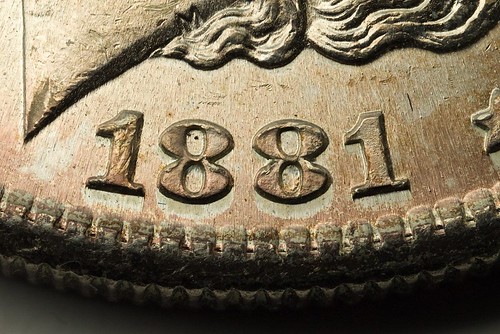
PREV ARTICLE
NEXT ARTICLE
FULL ISSUE
PREV FULL ISSUE
QUERY: AN OFTEN-SEEN COIN TONING EFFECT Steve Huber submitted the following note and image. This is an interesting toning effect that I've seen before, but had never heard a name for. Perhaps a reader can enlighten us on what causes this effect. -Editor Andrew Lustig and I have been in discussion as to the cause of an often seen doubling or 3D effect along the outside edge of a coins legend, stars, date, etc. The effect is caused by a lack of toning adjacent to and shaped like the device (numeral, letter or star). A macro view of the effect is exemplified by the attached picture by Mark Goodman of an 1881 Morgan Dollar, showing metal adjacent to the date does not tone with the rest of the coin. In our discussion, we have attempted to reason and research the cause. We believe that the metal is forced into and out of the devices. This force impacts or deforms the metal. In the center devices such as the portrait the effect is less and therefore the coin tones normally. As you get closer to the collar there is more stress as the metal is forced from the date, legend or star bending toward and rebuffed by the collar. We hypothesize this stress either changes or deforms the crystalline structure of the metal and perhaps hardening it at just that point adjacent to the devices closest to the collar. We have seen this effect on thousands of coins. We were hoping that one of your readers may be an accomplished metallurgist and can definitively explain the effect that leads to this lack of toning. Wayne Homren, Editor The Numismatic Bibliomania Society is a non-profit organization promoting numismatic literature. See our web site at coinbooks.org. To submit items for publication in The E-Sylum, write to the Editor at this address: whomren@gmail.com To subscribe go to: https://my.binhost.com/lists/listinfo/esylum All Rights Reserved. NBS Home Page Contact the NBS webmaster 
|